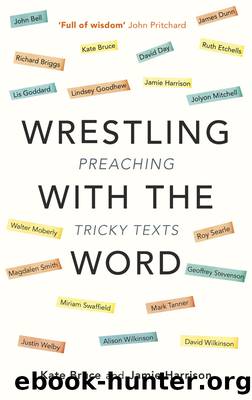Wrestling with the Word by Jamie Harrison

Author:Jamie Harrison
Language: eng
Format: epub
Publisher: SPCK
Published: 2016-10-10T00:00:00+00:00
Genesis 22.1â19
GEOFFREY STEVENSON
âAfter these things God tested Abraham. He said to him, âAbraham!â And he said, âHere I am.ââ (Genesis 22.1)
No parent should have to bury a child. Think of the entrance of Shakespeareâs Lear in Act V, carrying the body of his beloved Cordelia, made all the more poignant by foolish repudiation when she had failed to offer glib declarations of filial love. No parent should have to bury a child. Or Tolkienâs King Théoden grieving over the death of his son. Or, in the recent film Interstellar, the hero travelling into the future by passing through a black hole. Although he is 125 years old, he looks 40 when he then meets his daughter, now old, on her deathbed. She sends him away, so he wonât have to see her die.
No parent should have to bury a child. There is such profound grief in that loss: grief that time may dull, but never heal. Such a loss can split a marriage, with blame games or emotional retreat to where the other is not admitted. At every family gathering there is that sharp, gnawing awareness of the one who is absent and will never return. No parent should have to bury a child. And that tragic injustice is at the heart of the story of Abraham and Isaac, one that has engaged artists and resonated with believers down the ages.
A tricky text
Yet for moderns this is a difficult text. As soon as one takes even a tiny step away from the context, the story of a man commanded by God to take a son on a three-day journey to sacrifice him is almost impossible to hear. So many questions erupt. What father would even consider killing the son âwhom he lovedâ? What God would require that of a father and faithful servant, one to whom that very child had been promised to found a people? What child would willingly submit to being bound and readied for slaughter? And why is it only male characters involved? The listener has every right to ask such questions, but must do so within the great sweep of the biblical narrative and its teaching, and by attempting to understand the historical context and the early cultures of the biblical texts.
Progressive revelation
âCosmic child abuseâ is a phrase that has reverberated through contemporary theological debates, and with reason. This story, with other biblical stories of the offering of the firstborn, has been used, implicitly or explicitly, to support practices now unacceptable. One modern response is to say that the God of this text is not the God of the Christian faith. Or that at best, while the understanding and representation of the revelation of God was profound and perhaps even progressive for the founding stories of the people of Israel, that revelation has been refined and, in important ways, superseded by the revelations given to the Prophets, found in the teaching and example of Jesus, and in the writings of Paul and the Church Fathers.
Child sacrifice as a means of worshipping other deities is condemned and forbidden elsewhere in the Old Testament.
Download
This site does not store any files on its server. We only index and link to content provided by other sites. Please contact the content providers to delete copyright contents if any and email us, we'll remove relevant links or contents immediately.
Victory over the Darkness by Neil T. Anderson(2850)
The Rape Of Nanking by Iris Chang(2809)
Chosen by God by R. C. Sproul(2159)
Habits of Grace by David Mathis(1974)
Crash the Chatterbox by Steven Furtick(1973)
Knowing God by J.I. Packer(1850)
How To Be Born Again by Billy Graham(1775)
A Prophet with Honor by William C. Martin(1716)
Gospel-Shaped Marriage by Chad van Dixhoorn(1708)
Peace with God by Billy Graham(1679)
Confronting Christianity by Rebecca McLaughlin(1584)
God's Smuggler by Brother Andrew(1541)
Angel Dreams by Virtue Doreen Virtue Melissa(1472)
Whisper by Mark Batterson(1452)
Missionaries by Norman Lewis(1427)
The School of Biblical Evangelism by Ray Comfort(1425)
The Truth War by John MacArthur(1422)
The Poems of Rowan Williams by Rowan Williams(1350)
Do Greater Things by Robby Dawkins(1324)
